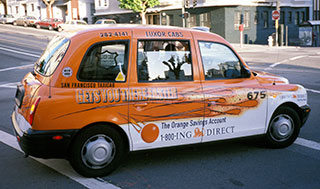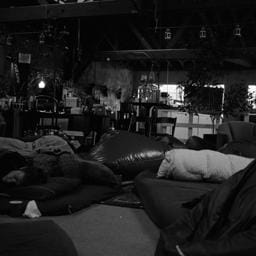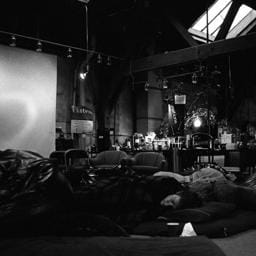Attack of the London taxis
 London-style taxis (also known as “Hackney carriages) are becoming a common sight in San Francisco, which is apparently one of the first cities in the US to get them. It is amusing, really, when most observers in London expected them to disappear a few years ago. The antiquated look of the London taxi endears it to Londoners, but more importantly, they are very roomy for passengers, and easy to get in and out of, even when you are carrying an umbrella…
London-style taxis (also known as “Hackney carriages) are becoming a common sight in San Francisco, which is apparently one of the first cities in the US to get them. It is amusing, really, when most observers in London expected them to disappear a few years ago. The antiquated look of the London taxi endears it to Londoners, but more importantly, they are very roomy for passengers, and easy to get in and out of, even when you are carrying an umbrella…
One (regular) taxi driver complained to me the London taxis are under-powered and do not go fast enough for him to zip to the other side of the city to pick a ride. Anyone who has seen taxicabs drive in this city knows this is a feature, not a bug, in the interests of public safety. Not that taxi drivers are worse than others – I have never been in another city where drivers violate red lights as casually as in San Francisco, even though I have lived in Paris and Amsterdam.
Taxis, along with docks, are one of the few domains in everyday life where byzantine nineteenth century work arrangements still prevail in defiance of the free market. Most cities arbitrarily limit the number of taxis that can ply the streets, a system that usually benefits taxi companies more than taxi drivers, who often end up in a position similar to sharecroppers. The quotas are seldom updated to reflect demand, due to lobbying by entrenched taxi companies, and cities like Paris or San Francisco often face severe taxi shortages. The French demographer Alfred Sauvy (PDF) related how ministers would fear the wrath of taxi strikers and chicken out of raising numbers.
In San Francisco, proposition K, passed in 1978, limits the number of taxi medallions to 1300. The measure was designed to let genuine taxi drivers, not companies, own the medallions, by requiring a nominal number of driving hours to retain the medallion. The lucky few who hold medallions lease them for $20,000-30,000 a year to taxi companies for when they are not driving themselves. Most actual taxi drivers do not have medallions and lease them for $100 a day or so from taxi companies (sharecroppers on plantations were not required to pay for the privilege of employment).
Of course, the people profiting from this cozy arrangement are never content – the permit holders want to drive less so they can enjoy the rent they are collecting from the coveted medallions. One attempted ploy was to reduce the driving hours requirement for disabled workers. Needless to say, had the measure been passed, overnight many permit holders would have found themselves mysteriously incapacitated. Taxi companies would like to grab medallions for themselves and cut off permit holders from the trough.
The right solution would be to abolish the medallion system altogether, or grant one to all working as opposed to rent-collecting drivers. But of course that is the one solution all vested interests are adamantly opposed to, as it would upset their apple cart. Given the abysmally dysfunctional state of San Francisco municipal politics, the situation is unlikely to improve. No amount of window-dressing with London style cabs is going to change that.
 I attended a rather unusual
I attended a rather unusual 








